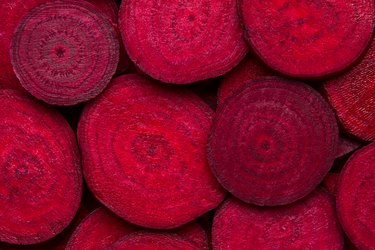
Beets can be a divisive vegetable — people tend to love or hate them — but they don't often cause stomach cramps. Rather, pain after eating beets may be due to a food intolerance, allergy or an overabundance of fiber. Beets may also be trouble for people sensitive to fructans, a carbohydrate.
Read more: What Are the Side Effects of Eating Beets?
Video of the Day
Video of the Day
Beets and Your Belly
"Beets are an incredibly healthy food, especially for people who exercise," says Will Bulsiewicz, MD, a gastroenterologist at Lowcountry Gastroenterology in Mount Pleasant, South Carolina. "But they are extremely dense and high in fiber, which all at once can be excessive for some people."
"Raw beets are also a high-FODMAP food, being high in fructans, which can cause digestive distress," Dr. Bulsiewicz says. Though foods high in FODMAPS — fermentable oligosaccharides, disaccharides, monosaccharides and polyols — are generally thought of as a concern to people with irritable bowel syndrome (IBS), most people have some threshold.
"People with IBS will be much more vulnerable to these issues if they exceed what their body is capable of dealing with," Dr. Bulsiewicz says. "But any of us can have problems if we consume fiber and FODMAPS to excess," noting that pickled beets are lower in fructans than raw beets. "Pickling them does make beets a bit gentler on the gut," he says. Cooked beets are also lower in fructans than raw beets.
Breaking Down Beets
According to the U.S. Department of Agriculture (USDA), 1 cup of raw beets has 58 calories, moderate amounts of common minerals like iron, potassium and magnesium, and nearly 4 grams of fiber, about 15 percent of the recommended daily value. Cooked beets are about the same in terms of fiber, slightly higher in vitamins and minerals and about 75 calories per cup, according to the USDA.
In addition to being high in fiber, beets are rich in phytonutrients, plant-based compounds that have been associated with enhanced immunity, healthy estrogen metabolism, the killing off of cancer cells and enhanced brain and cardiovascular health, according to the American Society for Nutrition.
"Beets contain nitrates that convert in the body to increase nitric oxide, which relaxes blood vessels and lowers blood pressure, allowing increased blood flow to tissues," Dr. Bulsiewicz says. "That's why they're so good for exercise."
Beetroot juice may also be of interest to people trying to control blood pressure, according to a meta-analysis published in November 2017 in Advances in Nutrition. The researchers found that beet juice consumption was associated with lower systolic and diastolic blood pressure readings, and that this effect was more pronounced in people with chronic diseases and people who had higher blood pressure to begin with.
Could I Have an Allergy?
Though beets are not among the most common food allergens — fish and shellfish, tree nuts and peanuts, soy, dairy and wheat — they could certainly be a problem for someone who does have an intolerance or an allergy to them. How to tell the difference?
"A food intolerance has more to do with your body being challenged to process and digest a food," Dr. Bulsiewicz explains. "The symptoms would be some type of digestive distress like gas, bloating and maybe diarrhea or constipation."
An allergy is an overreaction of the immune system to a substance. "Classically, we'd see a more severe reaction like hives on the skin, swelling of the lips or even difficulty breathing," he says.
If stomach cramps persist and are accompanied by shortness of breath, anemia or symptoms of anemia, unintentional weight loss, worsening digestive symptoms or blood in the stool, you should see a doctor.
"Ironically, the pigment in beets that gives them their intense crimson color passes through our digestive system, resulting in a bowel movement that can appear to have fresh blood in it," Dr. Bulsiewicz says. But this effect is limited — once the beets are gone, the redness should be too. "If it persists," he says, "that's a different issue."
Read more: The Effects of Beets on Bowels
- Will Bulsiewicz, MD, MSCI, gastroenterologist, Lowcountry Gastroenterology, Mount Pleasant, South Carolina, and author, "Fiber Fueled"
- USDA: "Beets, Raw"
- USDA: "Beets, Cooked, Boiled, Drained"
- American Society for Nutrition: "Plant Pigment Power of Phytonutrients and Vascular Health"
- Advances in Nutrition: "The Nitrate-Independent Blood Pressure-Lowering Effect of Beetroot Juice: A Systematic Review and Meta-Analysis"
Is this an emergency? If you are experiencing serious medical symptoms, please see the National Library of Medicine’s list of signs you need emergency medical attention or call 911.